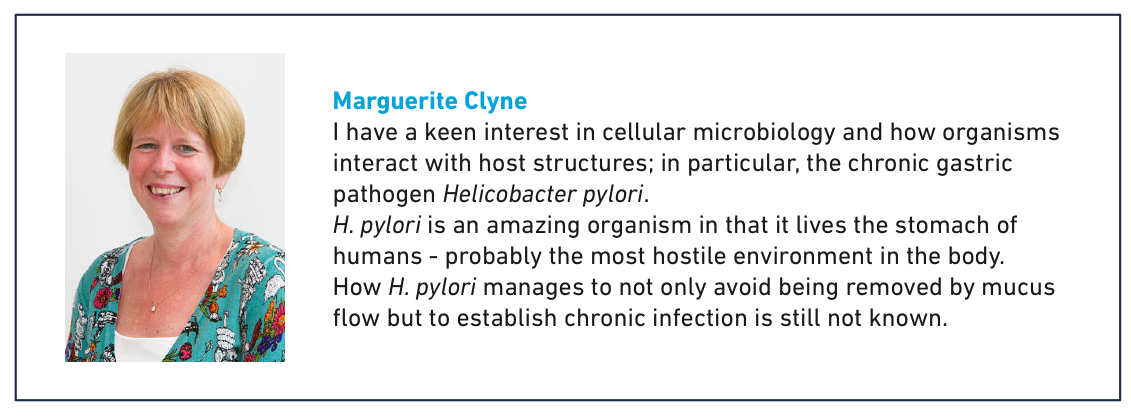Focused Meeting: Microbes and Mucosal Surfaces
Posted on May 24, 2018 by Laura Cox
On 21-22 June, the Microbiology Society Focused Meeting on Microbes and Mucosal Surfaces will be held at University College Dublin, Ireland. We caught up with Dr Marguerite Clyne ahead of the event to talk about why this is such an important meeting and what it will cover.

Marguerite, what will the Focused Meeting cover?
Mucosal surfaces such as the gastrointestinal, respiratory and urinary tracts are often home to the commensal microbiome. This diverse community of bacteria can prevent infection and contribute to the health of the host.
In spite of this protective microbiome, pathogens can still colonise the body via mucosal surfaces and cause infection, and in fact the majority of bacterial infections in humans and animals result from pathogens colonising the body via mucosal surfaces.
Mucosal surfaces are covered by a sheet of epithelial cells that act to prevent the entry of exogenous antigens and microbes into the host. A layer of mucus, containing large glycoproteins, covers these cells and can serve as a valuable source of nutrients for microbes.
Why is this topic so important?
A better understanding of how microbes, pathogens and commensals alike, interact with mucosal surfaces has the potential to generate novel approaches to the prevention and treatment of conditions such as dental caries, infectious diarrhoeal diseases, urinary tract infections and many respiratory infections, such as those associated with cystic fibrosis.
Elucidation of how one organism interacts with a mucosal surface gives us hints about how other organisms interact and opens up exciting possibilities for future studies. Next-generation sequencing data has provided us with a wealth of information about organisms that colonise or infect different niches in the body.
In addition, cell culture systems are becoming more and more sophisticated. The availability of 3D cell culture on scaffolds or use of organoids means that our model systems are now more biologically and physiologically relevant than ever before. This enables us to do some really meaningful experiments without always resorting to the use of animals.
Who organised the meeting and why?
This meeting is being organised by the Irish Division of the Microbiology Society and is one of two meetings that we organise in Ireland each year.
One of the main aims of these meetings, besides learning about really great science, is to promote collaboration between microbiologists in Ireland, the UK and further afield. The friendly relaxed atmosphere at these meetings means that they are fantastic opportunities for early career microbiologists to present their work and provide valuable opportunities to meet and chat to experts in their field.
Organising a meeting is always a bit nerve wracking. However, I was really heartened by the interest in this meeting from the outset and also the enthusiasm of the invited speakers. The support of the team at the Microbiology Society is second to none.
I hope everyone who comes has a great time and enjoys their visit to UCD and our Irish hospitality.

